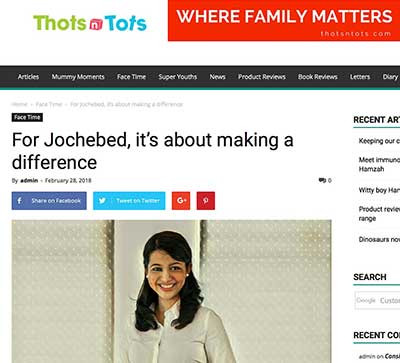
[Feature Article] Thots n Tots: For Jochebed, It’s About Making A Difference
For Jochebed, It’s About Making A Difference
Published in: Thots n Tots
Published on: 28th February 2018
.jpg)
Jochebed Isaacs can usually be seen at her centre, the Early Autism Project, where she works as a supervisor. She spends her days trying to help children on the autism spectrum develop to their full potential.
She takes time away from her busy schedule to answer some questions from Thots n Tots:
How long have you been a clinical psychologist?
I started working with Early Autism Project in the role of a supervisor from January 2007 and during this time started to do diagnostic evaluations and developmental assessments as well but specialising in the field of autism.
Where did you study?
I did a four-year Bachelor of Psychology with Help University and Curtin University of Technology, Perth, then my Masters of Clinical Psychology at University Kebangsaan Malaysia.
Why did you decide to be a psychologist? Who or what influenced this decision?
My initial intention was to work specifically in counselling, parenting and family therapy. My parents have always been involved in social work and encouraged us to look out for others from a young age. I volunteered for the first time at the age of four at an orphanage (being the only child at the time) then my mother encouraged me to do a bake sale at the age of six or seven when I was very upset by the Ethiopian famine. At nine, they encouraged me to stay a week at Bethany Home to volunteer and throughout school we would always be involved in some voluntary work.
What are some perks of being a clinical psychologist?
The main benefit is the fulfilment of a career that makes a difference in someone’s life. It is pretty wonderful to go to work each day, knowing that you are making a significant difference in someone else’s life.
Tell us about your work with persons with disabilities.
I started working with children with autism in late 2003 in Perth, Australia. Initially, it was a short summer job to get some clinical experience but after realising the benefits of the Applied Behavioural Analysis (ABA) approach, I wanted to really see this therapy develop in Malaysia. I then started working part time with a child in Malaysia who was being supervised by Wisconsin Early Autism Project (WEAP) and then did an internship in Madison, Wisconsin, from August till November 2006 after which I came back to Malaysia and joined the Malaysian branch, Early Autism Project (EAP), in January 2007 and have been here ever since! My clinical experience is primarily with the autism spectrum and have worked with a wide range of children with autism who are of different ages as well as different levels of autism.
What exactly do you do?
At present, my role consists of some business administration as well as clinical hands-on work. I still work with our kids with autism, specifically seeing each child on my case load on a bimonthly basis to provide support and direction to their supervisors. I do a number of diagnostic evaluations each month but most of my time is spent training and coaching the supervisors I oversee. Additionally, we are very involved in developing resources and partnerships for our nonprofit initiative, The Hope Project.
Do you also give a lot of talks and do interviews?
Yes, I do for the purpose of awareness, education but mostly for equipping parents and other teachers/professionals on how to work effectively with children with autism.
Do you mostly work with children?
Our main focus at EAP is individuals with autism and typically this is more children but we have clients from as young as two years old to as mature as 26 years old!
What is your policy or belief when it comes to children’s health?
As parents, we are all very aware of physical health and monitoring that closely through vaccination records, growth, and regular medical checkups. However, it is also very important that we are aware of each child’s mental and emotional health, and learn to read what they are trying to communicate and to see things from their perspective so we can teach them in a more effective way.
What is your best advice to parents when it comes to their children’s health and development?
It is very important for parents to be well-informed on the typical developmental milestones so they know what to expect and also know that if there are any observed delays, that they need to respond as soon as possible in order to give the appropriate intervention.
How many kids do you have?
We have one daughter so far and she is three years, three months old.
Has being a parent helped you in your job?
Yes absolutely, I feel like it has been a 24-hour, three-year training course on child development. While I feel that all the professional experience I have had has hugely helped my parenting, I also believe that having a child of my own has really sharpened my skills. Although I will never fully understand the challenges a parent with a child with autism faces, I certainly can identify better with the sacrifices and sheer exhaustion parents face, especially when juggling home and work.
If you could invent something child-related, what would it be and why?
A translator that could read what each child is trying to communicate and the world from their perspective so we can be better parents, teachers and help support their needs better!